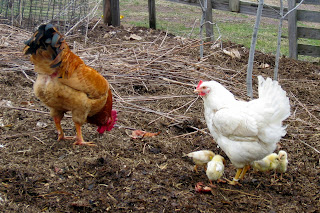Introducing Chicks to the Adult Flock
Recently, I was just talking to someone about what age to integrate chicks and how to go about it. When I first integrated new chicks into my adult flock (2010), I divided the coop & run in half, but they could see each other, but not touch. Once they were 3/4 the size of the adult hens, I then started to let them co-mingle. There was pecking and chasing, but the new pullets were big enough to withstand it - plus they greatly outnumbered the adult hens. In 2011 when I raised out pullet chicks & Freedom Ranger meat chickens (together) to 8 weeks or so, then began introducing them to each other, with a fence in between. After a week or more of this, then I started letting the adults and little ones co-mingle. There was lots of pecking, chasing, especially from one of the hens who was "lower ranks" & had been picked on by the other hens. So, I guess she was taking out her frustration on the young chicks. But, after awhile, everyone was accepted & "peace returned to the flock".
In 2012, I had my first broody hen, and the difference with how the flock accepted those chicks was incredible. The hen (my"famous" Daisy) protected the chicks and within a few days old, they were co-mingling with the adults. Later in the year she went broody again, as well as, another hen, Alix.
In 2013, I had many hens go broody, of whom raised the majority of my flock's chicks, along with a few from TSC. Here is one group from 2013 that spent the majority of their "growing up" life with the flock, who were always curious but didn't dare get too close to them.
These chicks are older, but yet still small. But, the adult hens didn't bother them too much.
These chicks are older, but yet still small. But, the adult hens didn't bother them too much.
2014 - all of my chicks were raised by broody hens, even the Cornish meaties & incubator chicks. They did very well, and it seemed like the adults were very accepting, almost "ignored" all the young'ins - partially because the hens would beat them up if they did, but even the more laid back hens' chicks were quickly accepted into the flock with hardly any pecking/chasing. Don't get me wrong, the adults still would peck at them if they go too close to their feed or later on, chose to roost in the coop in someone's favorite spot. But, the transition was pretty uneventful, especially compared to previous years. Here's a few of the chicks (Cornish, too) sharing food scraps with adult flock, and they're obviously not 8 weeks old yet.
This year, the first 3 hatches were all from incubators and raised indoors until it warmed up enough to put them outside. By that time, one hen had gone broody and was raising her chicks along with all the adult flock. I kept the older chicks (4-9 wks old) in a separate pen for a few days, then started letting the young stock out. The adults seemed most interested in trying to find a way to get to their food, but otherwise let them alone. Within a few days, the young and adults were digging in the compost pile and eating grass in the paddocks together. I have not seen the typical pecking, chasing that goes on - it's like everyone knows their rightful place and order - therefore all is well. It might also have to do with the majority of the Catskill Homesteader hens and roosters have been raised by a broody hen, been around a broody hen with chicks or has been broody herself. I've even witnessed some of the roosters clucking and calling to let the hens and chicks know "there's a special treat over here". Or sometimes, the rooster will stand guard by the hen and chicks while they eat, with his head held high and on the alert. Other times, he will share his food with one of the chicks, even the Cornish that are obviously not his offspring! (2014 photos - "Joseph" is the rooster)
What's also interesting to observe is how this year's 3 oldest batches of chicks (one of which was the Easter Hatch-a-Long) who weren't raised by broody hens very quickly learned to forage, and many have been busy excavating the compost pile in search for "goodies".
As you can tell, I love watching the flock dynamics, and as they are now a multi-generational breeding project, I'm seeing many qualities that I don't remember seeing when I had all-hen flocks, ordered from a hatchery and brooded by humans.








Comments
Post a Comment